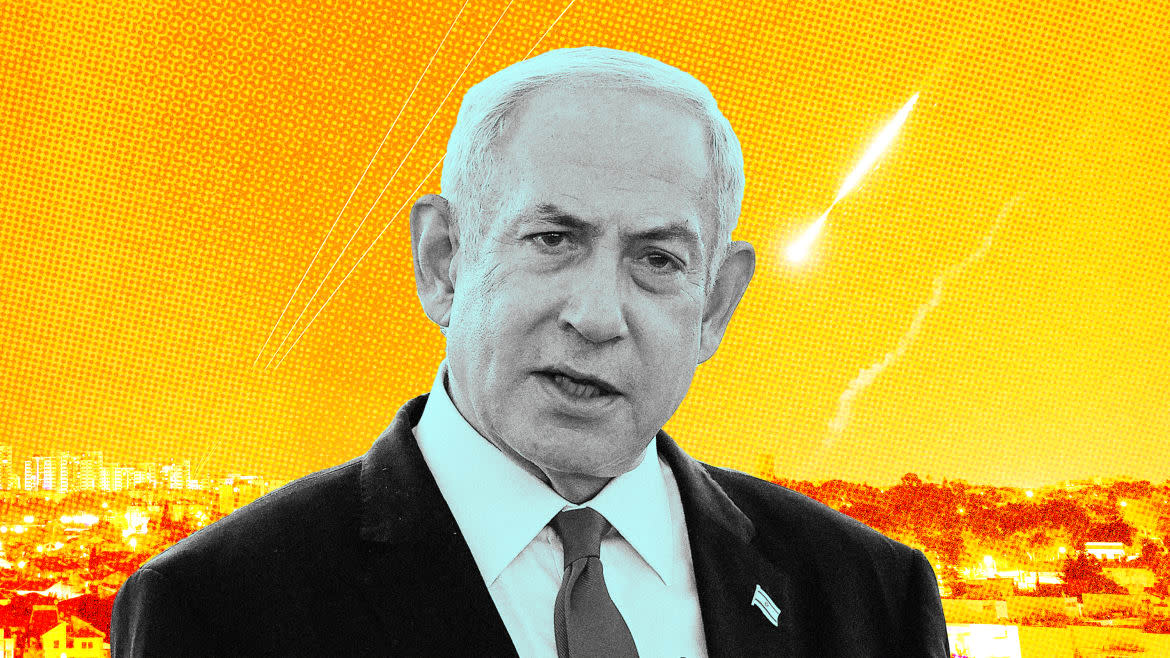The Big Question: Will Israel Hit Back at Iran?

Tehran did not heed President Joe Biden’s warning to not “strike Israel” and launched 200 explosive drones and ballistic missiles against the Jewish state on Saturday. The attack was the only direct Iranian offensive on Israel ever, and the first by a state since 1991.
Yet despite hours of live media coverage, the damage that Iran has inflicted on Israel seems to have been insignificant. The question has thus become: Will Israel now grasp an opportunity it has long waited for and respond?
Iran’s attack came to avenge an air strike—widely acknowledged to be from Israel—on Damascus that killed seven senior Islamic Revolutionary Guard Corps (IRGC) generals, including Mohamed Zahedi. Israel believes that Zahedi helped mastermind the October 7 Hamas attack, which led to the murder of 1,200 Israelis. Hamas confirmed the Israeli claims when it eulogized Zahedi, crediting him with building Hamas’s military wing and helping plan the October 7 attack.
Zahedi was not the first of the senior IRGC generals killed by Israeli airstrikes on Syria. But this time, Iran’s proxies—such as Hezbollah in Lebanon—voiced their expectations that the Islamic Republic would respond. The Lebanese saw no reason why they engage Israel in battle to help Hamas, but Iran does not, even after Israel had taken out a top Iranian general.
Tehran, for its part, feared that launching a first-ever attack from its territory on Israel would give the Jewish state a license to respond and take out strategic Iranian assets, including nuclear facilities that Israel believes Tehran is using to develop a nuclear weapon.
After a week of chest thumping, Iran finally attacked Israel from Iranian territory.
At face value, the attack looked big. To put it in perspective, consider that on a “hellish night” in Ukraine, Russia attacks Kiev with 50 Iran-made Shahed kamikaze drones. Iran fired over 100 of these. Tehran then “layered” its attack, in military lingo, with ballistic missiles that flew at much higher speed.
Once the Iranian drones were reportedly airborne, the Israel Defense Forces (IDF) seemed at ease, with its spokesperson Daniel Hagari finding enough time to hold a presser, during which he did not ask Israelis to head to bomb shelters.
Despite the sheer number of Iranian drones and missiles, the military value of the Iranian attack on Israel seems to have been insignificant, injuring one child and causing minor damage at a military base. Fighter jets from Israel, the U.S., the U.K., and Jordan helped shoot down most of the drones and missiles before they even reached Israeli airspace.
The attack’s political value, however, seemed significant. Since it took the Iranian drones some two hours to reach Israel, global media covered the attack live, with pundits analyzing the situation. Dozens of official statements were aired as breaking news.
Meanwhile, citizens of Iraq, Syria and Lebanon captured footage of the explosive drones cruising at high altitude and shining like comets in the dark night’s sky. In Jordan, citizens captured images of their air force scrambling to prevent Tehran’s drones from crossing its airspace, shooting down dozens of them.
Over the course of a few hours of live TV coverage, Iran announced to the world that it was not scared of striking Israel. But the slow motion attack also made the Islamic Republic the butt of jokes, especially with videos showing that some drones fell in Iranian territory.
Meanwhile, Iran telegraphed—through its UN delegation—that its “revenge” for Zahedi’s death had been exacted, and that it was not willing to carry the military confrontation further. Iran’s UN delegation warned of harsher punishments should Israel repeat its offense in the future.
In other words, Iran wanted to impress on its partisans that it had stood up to Israel and fought back, and by doing so, it has restored deterrence. But not so fast.
As the Iranian attack unfolded, Israeli officials were huddling and issuing statements to the effect that Tehran should expect an Israeli response.
On Sunday, Israeli Prime Minister Benjamin Netanyahu and President Biden spoke over the phone. The U.S. President, who had earlier said that America’s commitment to Israel’s defense was ironclad, seemed to have meant what he said—defense—verbatim. In his call, Biden told Netanyahu that America, which helped shoot down Iranian drones and missiles, did not support an Israeli counterattack.
Netanyahu might grasp the opportunity and hit the Iranian “octopus” on its head, instead of fighting with its proxy arms. Alternatively he might let the Iranian attack pass without an Israeli response for fear of aggravating his already strained relationship with Biden. Which direction the Israeli leader will go is anybody’s guess.
Get the Daily Beast's biggest scoops and scandals delivered right to your inbox. Sign up now.
Stay informed and gain unlimited access to the Daily Beast's unmatched reporting. Subscribe now.


